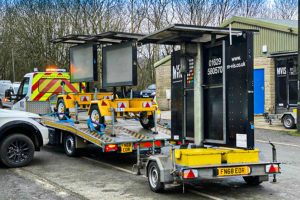News
How do you boost workforce safety amid COVID-19?
In our new socially distanced world, human interaction temporarily must take a back seat for the greater good.
As the nation stays indoors and does its part to stop the spread of COVID-19, travel and transportation outside of key services and journeys has seen a steep decline.
As a company accredited with ISO45001:2018 for Health and Safety Management, it should come as no surprise that MVIS is constantly monitoring and adapting protocols to keep their workforce, customers, and the public safe to the highest level of effectiveness.
Whether physical or mental health, MVIS places employee health, safety and wellbeing at the forefront of the business.
Telling the tail: The safer delivery model
The MVIS delivery model champions the deployment of multiple units over single unit deliveries wherever possible.
The key to doing so? The beavertail.

MVIS utilises beavertails to deliver multiple units per deployment
The use of beavertails within this delivery model enables the company to create this safer, more efficient method of working in these present times. Utilising beavertails in this manner, MVIS can deploy 3 x VMS A units, 2 x VMS C units, or 2 x Solar IP units in one delivery.
MVIS’ delivery model removes excess travel from daily operations, and as a knock-on effect – dramatically reduces the time their operatives are spending on both the road network and work sites amidst the current pandemic we face.
Additionally, the MVIS safer delivery model negates the requirement for MVIS staff to return to base on multiple occasions within the delivery process. This means there is a dramatic reduction in the time operatives spend both travelling on the road network, as well as in the frequency of social distancing measures via a reduction in human interaction across their premises.
In practice, a recent deployment in Wales from their Matlock HQ of 6 x VMS A units, saw MVIS complete delivery in just 2 journeys, with 2 VMS A units transported on the beavertail and 1 unit being towed on each journey.
Homeworker wellbeing
Even before the enforced home working guidelines, MVIS had started to make the shift to staff working from home wherever possible to further reduce unnecessary travel – a strategy they will continue to commit to post pandemic.
However, with COVID-19 making this a 5-days a week switch, the company is taking extra measures to make sure the mental health and wellbeing of their team isn’t sacrificed.
Environmental bonus: Greener delivery
The MVIS safer delivery model brings with it a more environmentally friendly method of keeping Britain moving.
The use of beaver tails in the process and the subsequent reduction in delivery journeys taking place provides an obvious showcase of a reduction in their carbon footprint.
In the recent six-unit deployment to Wales, MVIS’ ability to deliver in just two trips provides a decrease in journey time of 66% meaning an impressive reduction of two-thirds of emissions.

Delivery in practice: Multiple units are deployed to site
General Manager Anne Ashman told us:
“With unnecessary outings, working from home and social distancing now a key aspect of everybody’s life, we can take great pride on the emphasis we place on staff safety as now, perhaps more than ever, it is extremely prevalent.
“Since 2012 when the company was born, our delivery model has been based around not only efficient service, but workforce safety. Keeping our team off the network where possible, whilst continuing to deliver the high levels of customer service we are known for.
“As the government continues to rightly place such a focus on public health, we want to urge both companies and individuals to look at ways they can look after their teams not just now, but way beyond the challenges that COVID-19 is throwing at us all.
“Additionally, we place environmental factors high on the list of things to consider, and over the years we’ve taken steps such as those within our delivery model to reduce our carbon footprint.
“Whilst we all look after each other by staying indoors, we can also focus on the long-term benefits of both workforce safety, as well as the environment, that these new protocols can provide long after the Coronavirus isn’t our biggest daily concern.”
Source: highwaysindustry.com


